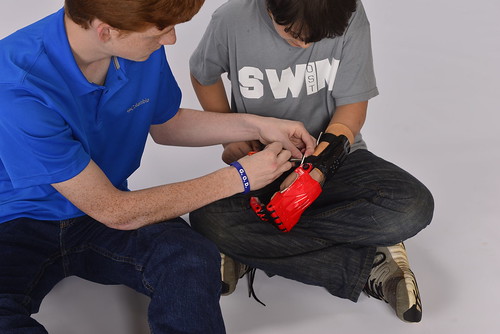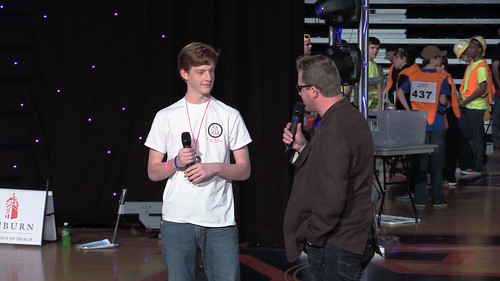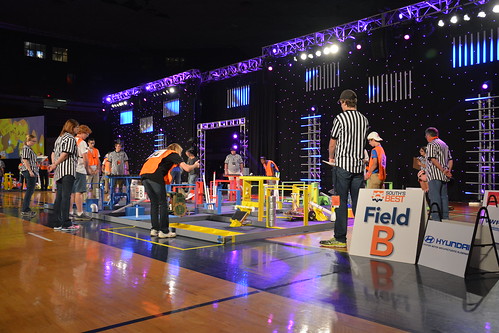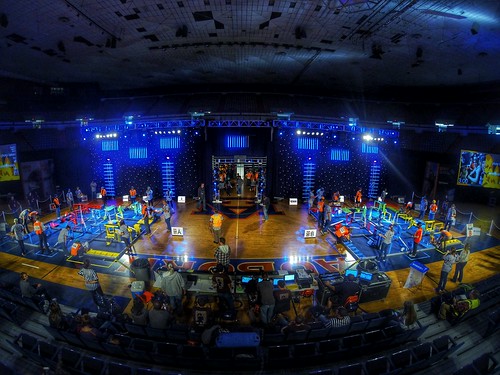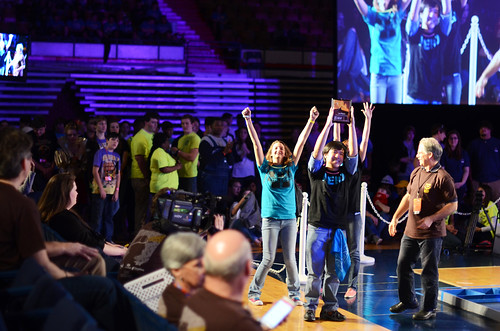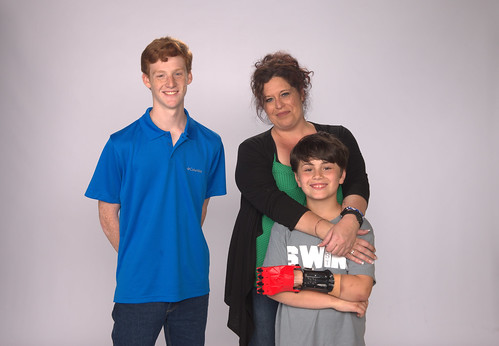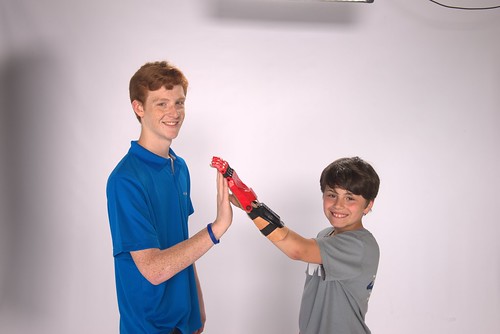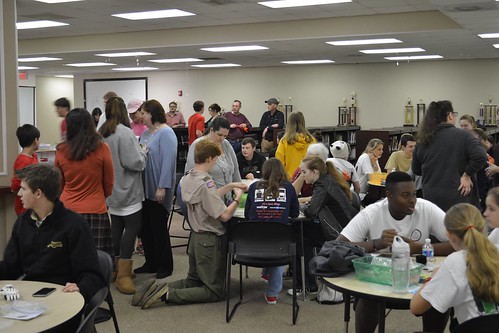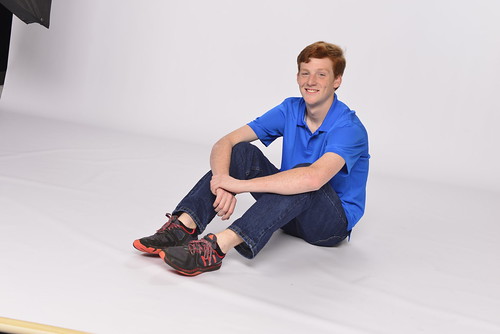COSAM News Articles 2016 April BEST Robotics participant changes children’s lives, one hand at a time
BEST Robotics participant changes children’s lives, one hand at a time
In Vietnam, a group of approximately 30 children are missing fingers or parts of their hands or arms, conditions most have endured since birth. Prosthetic replacements are available, but are largely unattainable for this group because of the high cost – as much as $100,000 – and the fact that children outgrow their prostheses just as they do clothing.
Enter Zach McCleery, a junior at St. Luke's Episcopal School in Mobile and longtime participant in the Auburn University BEST, or Boosting Engineering Science and Technology, robotics program sponsored by the College of Sciences and Mathematics and the Samuel Ginn College of Engineering. McCleery took inspiration from his BEST experience and executed an Eagle Scout project to coordinate the purchase, production and construction of affordable prosthetic hands that could be shipped overseas to the Vietnamese children.
Opelika resident Melina Brown, director of case management and quality assurance for Enable Community Foundation, worked with McCleery on his project – a connection made because Brown's son needed a prosthetic hand. The foundation supports an international network of volunteers using 3D printing technology to design, deliver and distribute free upper-limb prosthetics to children and other underserved populations around the world. Unlike traditional prosthetic devices which are often created to look as realistic as possible, the hands created through the foundation are brightly colored, made of plastic and more closely resemble a superhero robot hand.
"My aunt knew how interested I was in prosthetic hands and engineering things that can grab, and she is actually the one who told me about Enable," said McCleery. "I saw the prosthetic hand and thought it was the coolest thing. I fell in love with the idea of being able to create a hand for a child or an adult, and, although I am only a junior in high school, being able to change someone's life."
McCleery initially worked with Brown to design a single hand for her son, an experience that allowed him to assess the logistics involved in finding sponsorship, volunteers and hosting a massive hand-building workshop for his Eagle Scout project.
The prosthetic hands provided by the Enable Community Foundation are relatively easy to assemble, so much so that K-12 STEM education teachers around the country are incorporating hand-building projects into their classrooms as a lesson in both engineering and solving real-world problems.
McCleery was able to raise enough funds to purchase the parts to create 28 hands. He then hosted an all-day event in his school library where approximately 100 volunteers assisted in assembling the hands.
The hands were presented to Brown and the Enable Community Foundation during the South's BEST Robotics championship at Auburn University. The foundation then identified children in Vietnam in need of affordable prostheses and had McCleery's prosthetic hands shipped to them, thus providing life-changing and kid-friendly devices at no cost to the children's families.
McCleery began participating in BEST Robotics when he was in sixth grade. The primary objectives of BEST are to provide students with a real-world engineering experience that incorporates the practical application of math and science; prepare students to be technologically literate and thus better prepared to enter the workforce; help students develop leadership, project management, teamwork and organizational skills; and develop confidence and competence.
"I am an engineer at heart and I love robotics," said McCleery. "I was on our school's BEST Robotics claw team for a couple of years and I have always enjoyed making things that will grab things."
The St. Luke's claw team division is responsible for designing and building the mechanism on the robot that will pick up and deliver items on the competition playing field. For the 2015-16 academic year, McCleery was the St. Luke's robotics team chief engineer, as well as one of the robot operators during the competition.
"Robotics has really helped me a lot," said McCleery. "I have always liked engineering and Legos were a big part of my childhood, but participating in robotics let me know I could pursue something like building prosthetic hands for my Eagle Scout project. BEST has taught me to work as a team and to listen to others – even the sixth graders who might just have the best ideas. BEST helps you to listen and truly think outside the box. In robotics, you have to work as a company. You have a marketing side, a presentation side, an engineering side and you all have to work together. If you don't, the whole company can fall apart."
"My role with the foundation is to supervise our matching process and our test hand process, and various other administrative duties," said Brown. "Our matching process is fairly simple. We ask that parents fill out an intake form. After that they are required to send three very specific photos from which we are able to gain measurements for their child using automated measurement software. We then decide their needs and we match them with a volunteer from approximately 7,000 worldwide. The volunteer then takes over and works one-on-one with the family and makes the required device for the child. A lot of our volunteers go all out and make Superman- or Spiderman- or Frozen-inspired hands. It just depends on their capability and their time. It's kind of a magical thing."
Brown, whose son Ethan has received multiple hands through the Enable Community Foundation, including the one from McCleery, said the device is a life-changer, especially for children.
"My son loves the hand," said Brown. "He was being teased at school, so for him the hand has become an equalizer. When a child walks through the door with this brightly colored superhero-looking hand, the other children wish they had one too and it levels the playing field a little bit. It's just enough to take a child who was feeling a little upset about what they are stuck with, something that they couldn't change, and it increases their self-esteem. Suddenly they are getting attention and it's not negative. So that negative becomes a positive through a $40 piece of plastic. It changes everything. My son has gone from hiding his hand to speaking in front of groups of people about his experiences and how it has changed his life."
At $40 per hand, the devices are so inexpensive, the Enable Community Foundation volunteers are able to find ways to provide their services at no cost to recipients. They have supplied more than 1,500 hands to recipients all over the world, and their design is open source, meaning anyone can use their template to create their own hand.
"Zach is a wonderful young man, very intelligent, very organized and he ran his event as well as any adult could," said Brown. "We were very impressed with what he was able to accomplish at such a young age."
"To be able to change someone's life, like, a kid who didn't have a hand, to be able to give them a hand so they can ride a bike or climb a tree, ride a scooter, or whatever, to be able to truly change someone's life, especially as a junior in high school, is incredible," said McCleery. "This isn't about my Eagle Scout project; it's about the kids I have been fortunate enough to help – those kids are the true heroes. And Jubilee BEST has introduced me to something new I would never have experienced otherwise, and also the Enable Community Foundation – they are the true heroes."
The 2015-16 academic year was the 15th year the South's BEST championship was hosted at Auburn University, and BEST Robotics is the only such program in the nation that is available to schools at no cost.
In the past 15 years, Mary Lou Ewald, director of outreach for the College of Sciences and Mathematics, has witnessed numerous students like McCleery who have been inspired by their participation in robotics. She recalls a student from Pickens County, a rural area in northwest Alabama, who was bright but whose teacher noted was completely uninspired and had no plans to attend college.
"BEST lit a fire under this young man and by the time he became a senior, he set his sights on attending the U.S. Air Force Academy, which he did, and today is an officer in the Air Force," said Ewald. "He contacted me a few years after he graduated from the academy to let me know that his participation in BEST was the sole inspiration that led to his success."
Looking toward his future, McCleery said he is interested in pursuing nursing school and working in an emergency room, or possibly a career in biomedical engineering, and this fall, he will apply for acceptance to Auburn.
Students like McCleery and the proven record of affecting positive change through outreach programs such as BEST Robotics are the reason Ewald and her team continue to strive in their efforts to bring opportunities to kids throughout the state and beyond.
"It is so rewarding for me, and for the whole COSAM Outreach staff, to learn about the personal success stories of students who have participated in our programs," said Ewald. "The impact that Zach and his project have had and will have on others has so many positive layers that I honestly get emotional when I think about it. What one child can do when given the opportunity is inspiring. What many children can do when given the opportunity is staggering. What I can do is make sure COSAM continues to support opportunities like BEST Robotics for students. Kids like Zach are a reminder that I have the best job in the world."
A national robotics program geared toward middle and high school students, BEST Robotics culminates in one of four regional championships, including South's BEST, which is headquartered at Auburn University. This year's championship featured the top 55 teams from regional hubs in Mississippi, Alabama, Georgia, Tennessee and Florida.
The robotics team at St. Luke's is part of the Jubilee BEST Robotics hub, which consists of 40 schools from southern Alabama and the Mississippi Gulf Coast.
During the South's BEST championship, teams compete in a series of head-to-head matches on a playing field where robots score points by picking up objects, maneuvering around various obstacles, and placing the objects in specified locations.
For more information on the College of Sciences and Mathematics Office of Outreach and the BEST Robotics program, visit the website at www.auburn.edu/cosam/outreach.
Latest Headlines
-
02/12/2025
-
02/11/2025
-
02/10/2025
-
01/30/2025
-
12/03/2024

